

OTHER REGIONAL SUPRANATIONAL UNIONS. StrategicCollaboration. Untitled. Everyone agrees partnership working is a good thing and there should be more of it.
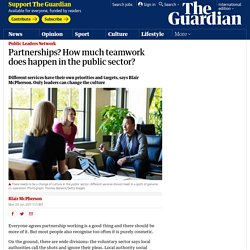
The Ten Stages of Successful Strategic Alliances. Corporate partnerships resemble marriages in many respects – including an unfortunately high failure rate.

The number of companies establishing strategic partnerships is growing all the time. According to Greve, Rowley and Shipilov, companies around the world formed nearly 42,000 alliances between 2002 and 2011. Steve Steinhilber cites a report claiming that more than 2,000 strategic alliances are launched each year and the number is growing at 15 percent per annum. This is not surprising because partnerships can have significant cost and speed advantages over the alternatives: to buy or build. When they work, they bring significant value, with lower costs and shared risk. Increase the speed of innovation and new product/service development Accelerate growth (for example, by opening new markets or creating opportunities to sell to new customer segments) Rapidly respond to changing market needs Access new capabilities or talent.
Simple Rules for Making Alliances Work. It’s a remarkable paradox: Studies show that the number of corporate alliances increases by some 25% a year and that those alliances account for nearly a third of many companies’ revenue and value—yet the failure rate for alliances hovers between 60% and 70%.

And despite an abundance of advice on how to make alliances work, that dismal record hasn’t improved in the past decade. The conventional advice from the experts is quite consistent: Create a solid business plan backed up by a detailed contract. Define metrics for assessing the value your alliance delivers. Seek common ground with partners and pay close attention to managing your interface with them. Establish formal systems and structures. Alliances, however, are not just any business arrangement. To begin achieving reliably higher success rates with their alliances, companies need to shift their focus to five principles that complement the conventional advice.
Five Principles that Complement the Conventional Advice Principle 1. Coronavirus UK: unions warn over lack of sick pay for gig economy workers. The government has been accused of failing to grasp the threat of gig economy workers spreading coronavirus, after a minister advised those with no sick pay who have to self-isolate to claim benefits instead.
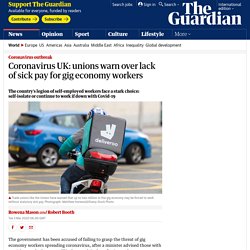
Downing Street is under huge pressure from trade unions and Labour to promise statutory sick pay to all workers when it unveils its coronavirus action plan, due to be published on Tuesday. Entering the Gig Economy. Professor David Collings - DCU Business School. David Collings (PhD, Limerick) is Professor of Human Resource Management and Associate Dean for Research at DCU.

Prior to joining DCU, he held faculty positions at the National University of Ireland, Galway and the University of Sheffield. He was also Visiting Professor at King’s College London. Prof Collings is Senior Consulting Editor at the Journal of World Business. Column: Employers blame gig worker law AB 5 for their own cheapness. Freelance writers in California who have been seeing their publishing opportunities sharply cut back or even eliminated by publishers are blaming the state’s new gig economy law, which goes into effect on New Year’s Day.
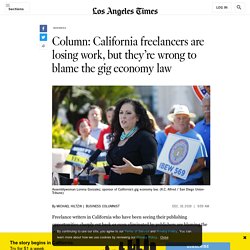
No one can deny these workers are being put through the wringer. For many, freelance assignments are their principal source of income. Is inequality here to stay? - War, plague, capital flows and factories. IN HIS bleak economic history “The Great Leveler” (reviewed here), Walter Scheidel suggests says that inequality has been around ever since humans began farming and that only the “four horsemen”—mass warfare, genuine revolution, state collapse and pandemics—have managed to bring it down since.
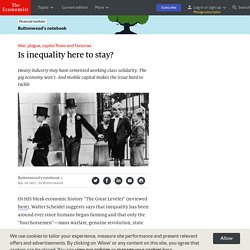
This leaves a grim choice: accept inequality or wish for disaster. It seems worth tweaking this argument to think about what explains the “great compression”—the period from the 1940s to the 1980s when Western societies were more equal than before. Yes, this was in part the result of the second world war, which led to the imposition of high taxes. It was also down to a change in political climate after the war. Get our daily newsletter. More than 1m UK workers denied legal holiday pay – analysis. More than a million workers in Britain do not receive any of the holiday pay they are guaranteed by law, according to a report exposing the scale of violations in the UK jobs market.
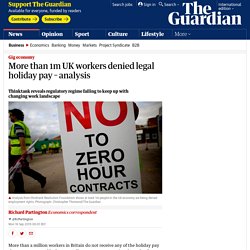
According to analysis from the thinktank Resolution Foundation, workers across the country are being failed by employers abusing their rights, amid a steady rise in precarious working conditions over the past decade. The report comes against a backdrop of rising use of zero-hours contracts and temporary and agency employment in the years since the 2008 financial crisis. Workers in the gig economy are also not guaranteed employment rights such as sick and holiday pay, leading to disputes about their employment status. It also comes after Jeremy Corbyn announced plans last week for the creation of a ministry of employment and a workers’ protection agency to enforce employment rights granted under law, should Labour be elected to power. Widow of driver who died after hospital visit fine faces eviction. The widow of a gig economy worker who died after skipping hospital appointments because he was afraid of being charged for missing work is facing possible homelessness in a development exposing the widening impact of insecure employment.

Ruth Lane has been served with an eviction notice after falling into rent arrears since her husband, Don, 53, collapsed and died from a heart attack related to diabetes. Report: The Freelancing Agenda – Labour Business. A new LFIG report calls for freelancing to be placed at the heart of the Labour party’s policy agenda.
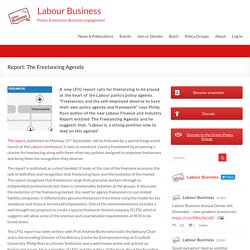
“Freelancers and the self-employed deserve to have their own policy agenda and framework” says Philip Ross author of the new Labour Finance and Industry Report entitled ‘The Freelancing Agenda’ and he suggests that. “Labour is a strong position now to lead on this agenda”. The report, published on Monday 15th September, will be followed by a special fringe event launch at the Labour conference. New York gig economy under threat as city cracks down on app-based services. The gig economy is having a bad summer in New York City. New York this month became the first major city to cap the number of cars that companies like Uber and Lyft are allowed to put on the road. Just weeks earlier, the city council approved and New York’s mayor, Bill de Blasio, signed a law to crack down on Airbnb, requiring the company to hand over the names and addresses of all its hosts to an enforcement office.
DiiferentTypesofAlliance (2) Talk to Deliveroo couriers. See a dystopia that could be your future. A Black Mirror existence: that’s how trade unionist Mags Dewhurst describes working as a rider for Deliveroo, the pre-eminent online food-delivery company. Here is a story of workers branded as entrepreneurs, which has the effect of stripping away their rights; of a race to the bottom in terms and conditions; of being managed by algorithms and apps. I sit with five Deliveroo couriers in the headquarters of the Independent Workers Union of Great Britain (IWGB), a union that has successfully fought for particularly low-paid migrant workers. They are currently classed as self-employed independent contractors, or cycling micro-businesses, and therefore lack rights all workers should be able to take for granted: the minimum wage, paid holidays, pensions, protection from discrimination, and trade union rights.
Supranational aspects of international organizations. Many international organizations also have supranational aspects, meaning that decisions can be made by the organization as a whole that are binding on member states that disagree. Definition[edit]